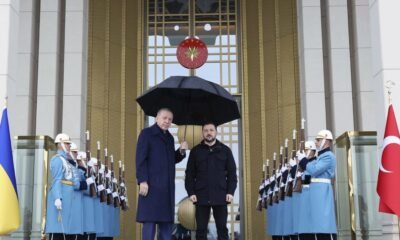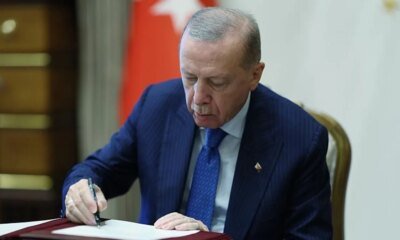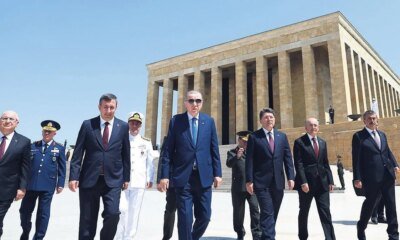Economy
Israel-Iran strikes, anti-Trump protests keep investors on edge
Dual risks kept investors on edge ahead of markets reopening late on Sunday, from prospects of a broad Middle East war amid Israel-Iran tensions to nationwide protests against U.S. President Donald Trump that threatened more domestic chaos.
Israel launched a barrage of strikes across Iran on Friday and Saturday, saying it had attacked nuclear facilities and missile factories and killed a swathe of military commanders in what could be a prolonged operation to prevent Tehran from building an atomic weapon.
Iran launched retaliatory airstrikes at Israel on Friday night, with explosions heard in West Jerusalem and Tel Aviv.
On Saturday, Israel’s Prime Minister Benjamin Netanyahu said Israeli strikes would intensify, while Tehran called off nuclear talks that Washington had held out as the only way to halt the bombing.
Israel on Saturday also appeared to have hit Iran’s oil and gas industry for the first time, with Iranian state media reporting a blaze at a gas field.
The strikes knocked risky assets on Friday, including stocks, lifted oil prices and prompted a rush into safe havens such as gold and the dollar.
Brent crude prices were at $74.23 on Sunday midday after they touched an intraday high of $78.50 on Friday, a multi-month peak. U.S. West Texas Intermediate crude finished the week at $72.98 a barrel, up $4.94, or 7.62%.
Both benchmarks had their largest intraday moves since 2022 when Russia’s invasion of Ukraine caused a spike in energy prices.
Risks mounting
Meanwhile, protests, organized by the “No Kings” coalition to oppose Trump’s policies, were another potential damper on risk sentiment. Hours before those protests began on Saturday, a gunman posing as a police officer opened fire on two Minnesota politicians and their spouses, killing Democratic state assemblywoman Melissa Hortman and her husband.
All three major U.S. stock indexes finished in the red on Friday, with the S&P 500 dropping 1.14%.
Israel and Iran are “not shadowboxing anymore,” Matt Gertken, chief geopolitical analyst at BCA Research, told Reuters. “It’s an extensive and ongoing attack.”
“At some point, actions by one or the other side will take oil supply off the market,” and that could trigger a surge in risk aversion by investors, he added.
Any damage to sentiment and the willingness to take risks could curb near-term gains in the S&P 500, which appears to have stalled after rallying from its early April trade war-induced market swoon. The S&P 500 is about 20% above its April low, but has barely moved over the last four weeks.
“The overall risk profile from the geopolitical situation is still too high for us to be willing to rush back into the market,” said Alex Morris, chief investment officer of F/m Investments in Washington.
U.S. stock futures are set to resume trading at 6 p.m. (10 p.m. GMT) on Sunday.
With risky assets sinking, investors’ expectations for near-term stock market gyrations jumped.
‘Fear gauge’ soaring
The Cboe Volatility Index (VIX) rose 2.8 points to finish at 20.82 on Friday, its highest close in three weeks.
The rise in the VIX, often dubbed the Wall Street “fear gauge,” and volatility futures were “classic signs of increased risk aversion from equity market participants,” said Michael Thompson, co-portfolio manager at boutique investment firm Little Harbor Advisors.
Thompson said he would watch near-term volatility futures prices for any rise toward or above the level for futures set to expire months from now.
“This would indicate to us that near-term hedging is warranted,” he said.
The concerns over potential attacks on oil refineries, particularly in Iran, also add to the risks over prices in energy markets, which were already shaken due to uncertainty amid on-and-off Trump’s tariffs. However, analysts, despite the situation being tense, predict more unease only if prices soar above $100 per barrel.
Iran’s oil ministry denied on Sunday reports of an incident at Isfahan refinery, Reuters cited state media as saying.
Israel’s Oil Refineries, meanwhile, said its pipelines and transmission lines in Haifa had been damaged by missile strikes by Iran, according to a regulatory filing to the Tel Aviv Stock Exchange.
It said that no injuries or casualties were reported at the sites, with refining facilities continuing to operate despite a shutdown of some downstream operations.
Despite the spike in crude prices, the global benchmark Brent remained well under $80 a barrel. Irene Tunkel, Chief U.S. Equity Strategist at BCA Research, said on Friday she does not see long-term U.S. market implications unless prices soar above $100 a barrel, which would hurt consumer spending.
She said that was unlikely unless oil infrastructure is destroyed or “Iran somehow closes the Strait of Hormuz and (the conflict) spills out of Iran and energy production in Iraq is shifted.”
However, BCA’s Gertken said that the mix of domestic and global tensions is a recipe for more uncertainty and unease across most markets.
“Major social unrest does typically push up volatility somewhat, and adding the Middle Eastern crisis to the mix means it’s time to be wary.”
Economy
Chinese shippers defy tensions as exports top expectations in July
China’s exports exceeded forecasts in July, as manufacturers capitalized on a fragile tariff truce between Beijing and Washington to ship goods, particularly to Southeast Asia, ahead of tougher U.S. duties targeting transshipment.
Global traders and investors are waiting to see whether the world’s two largest economies can agree on a durable trade deal by Aug. 12 or if global supply chains will again be upended by the return of import levies exceeding 100%.
U.S. President Donald Trump is pursuing further tariffs, including a 40% duty on goods rerouted to the U.S. via transit hubs that took effect on Thursday, as well as a 100% levy on chips and pharmaceutical products and an additional 25% tax on goods from countries that buy Russian oil.
China’s exports rose 7.2% year-on-year in July, customs data showed on Thursday, beating a forecast 5.4% increase in a Reuters poll and accelerating from June’s 5.8% growth.
Imports grew 4.1%, defying economists’ expectations for a 1.0% fall and climbing from a 1.1% rise in June.
China’s trade war truce with the U.S. – the world’s largest consumer market – ends next week, although Trump hinted that further tariffs may be imposed on Beijing due to its continued purchases of Russian hydrocarbons.
“The trade data suggests that the Southeast Asian markets play an ever more important role in U.S.-China trade,” said Xu Tianchen, senior economist at The Economist Intelligence Unit.
“I have no doubt Trump’s transshipment tariffs are aimed at China, since it was already an issue during Trump 1.0. China is the only country for which transshipment makes sense, because it still enjoys a production cost advantage and is still subject to materially higher U.S. tariffs than other countries,” he added.
China’s exports to the U.S. fell 21.67% last month compared to the same period a year earlier, according to the data, while shipments to the Association of Southeast Asian Nations (ASEAN) rose 16.59% over the same period.
The levies are bad news for many U.S. trading partners, including the emerging markets in China’s periphery that have been buying raw materials and components from the regional giant and furnishing them into finished products as they seek to move up the value chain.
China’s July trade surplus narrowed to $98.24 billion from $114.77 billion in June. Separate U.S. data released on Tuesday showed that the trade deficit with China shrank to its lowest level in more than 21 years in June.
Despite the tariffs, markets showed optimism for a breakthrough between the two superpowers, with China and Hong Kong stocks rising in morning trade. Trump indicated earlier this week that he might meet Chinese President Xi Jinping later this year if a trade deal was reached.
Trade uncertainty
China’s commodities imports painted a mixed picture, with soybean purchases hitting record highs in July, driven by bulk buying from Brazil while avoiding U.S. cargoes. Analysts, however, cautioned that inventory building may have skewed the import figures, masking weaker underlying domestic demand.
“While import growth surprised on the upside in July, this may reflect inventory building for certain commodities,” said Zichun Huang, China economist at Capital Economics, pointing to similarly strong purchases of crude oil and copper.
“There was less improvement in imports of other products and shipments of iron ore continued to cool, likely reflecting the ongoing loss of momentum in the construction sector,” she added.
A protracted slowdown in China’s property sector continues to weigh on construction and broader domestic demand, as real estate remains a key store of household wealth.
Chinese government advisers are stepping up calls to make the household sector’s contribution to broader economic growth a top priority at Beijing’s upcoming five-year policy plan, as trade tensions and deflation threaten the outlook.
Reaching an agreement with the U.S. and the European Union, which have accused China of producing and selling goods at too low a price, would give Chinese officials more room to advance their reform agenda.
However, analysts expect little relief from Western trade pressures. Export growth is projected to slow sharply in the second half of the year, hurt by persistently high tariffs, President Trump’s renewed crackdown on the rerouting of Chinese shipments and deteriorating relations with the EU.
Economy
Climate change drives up global food prices, adds to societal risks
Extreme weather patterns and events resulting from climate change are causing the prices of food products, such as coffee, cocoa and rice, to rise in various countries and regions around the world, according to a report released on Thursday, citing a recently published study.
The increase in temperature and extreme weather events, such as floods and storms, caused by climate change, also affect agricultural activities and threaten food security.
In July, scientists from various research institutes in Europe conducted a study titled “Climate extremes, food price spikes and their wider societal risks.”
In the study, which examined the impact of climate change on food prices, scientists compiled reports highlighting the rise in food prices across different countries due to climate extremes.
According to the study, agricultural products affected by climate change vary according to their geographical location.
The severe droughts experienced in Southern Europe during 2022-2023 led to a 50% increase in olive oil prices across the European Union as of January 2024. Moreover, at the beginning of 2024 in the U.K., potato prices rose by 22% due to rainy weather conditions.
In East Asia, the heat waves in 2024 led to extreme temperatures in almost all of South Korea and Japan, as well as large areas of China and India. These extreme weather events increased the price of Korean cabbage by 70% in September 2024 compared to the same month the previous year. Japanese rice also rose by 48% during the same period. Additionally, vegetable prices in China increased by 30% in June and August.
Impact on various crops
In Vietnam, after the heat wave in February 2024, robusta coffee prices doubled by July. Similarly, in Indonesia, following the drought in 2023, rice prices increased by 16%.
And in Pakistan, food prices in rural areas rose by 50% within weeks following the devastating floods in August 2022. In neighboring India, following the heat wave in May 2024, onion and potato prices surged in the second quarter of the year. During this period, onion prices increased by 89% and potato prices by 81%.
In Australia, the floods in 2022 caused lettuce prices to rise. During this period, lettuce prices increased by staggering 300%.
After the heat wave in March 2024 in South Africa, corn prices rose by 36% in April. The 2022 drought in Ethiopia also had an adverse impact on food prices. Following the drought, food prices increased by 40% in March 2023.
At the same time, back in 2022, drought in the American states of California and Arizona, which provide over 40% of the national vegetable production, severely affected vegetable production. As of November 2022, vegetable prices in the U.S. increased by 80% in one year.
Following the 2023 drought in Mexico, there was a 20% increase in fruit and vegetable prices at the beginning of the following year.
Coffee, cocoa prices
Climate extremes not only caused price increases locally but also increased the global market prices of major food commodities such as coffee and cocoa.
The 2023 drought in Brazil, the world’s largest coffee producer, led to price increases. Global coffee prices rose by 55% in August 2024.
In Ghana and Ivory Coast, which account for about 60% of global cocoa production, extreme heat in February 2024 and ongoing prolonged drought from the previous year affected global cocoa prices. Cocoa prices increased by about 300% in one year as of April 2024.
Affecting numerous crops and spreading globally, the climate-induced surge in food prices can trigger various societal risks.
Increasing food prices, particularly for low-income households, significantly affects their food security. Such households may become less resistant to diseases due to inadequate nutrition, adding additional burdens to the health care system and increasing public expenditures.
Moreover, increases in food prices lead to a rise in overall inflation, posing significant risks for developing countries where the share of food prices in inflation is high.
Economy
Consortium with Turkish firms inks $4B deal to develop Damascus Airport
A five-company consortium led by Qatar’s UCC Holding and comprising three Turkish firms signed a $4 billion deal on Wednesday with the Syrian Civil Aviation Authority to develop and expand Damascus International Airport.
The deal was one of several agreements signed in Damascus during a ceremony attended by Syrian interim President Ahmed al-Sharaa, worth $14 billion, including infrastructure, transportation and real estate projects aimed at reviving the war-damaged economy.
Turkish companies Kalyon Holding, Cengiz Holding and TAV Construction, along with UCC Holding and Assets Investments from the U.S., will be involved in redeveloping Damascus International Airport, aiming to raise its annual passenger capacity to 31 million within eight years, an Anadolu Agency (AA) report said.
The deal marks one of the largest infrastructure projects in Syria in years, despite the country’s prolonged instability following more than a decade of civil war and the wider impacts of the second year of Israel’s genocidal war on Gaza and regional conflicts.
According to a statement from Kalyon Holding, the companies involved have carried out global-scale investments in energy, infrastructure and transportation both in Türkiye and abroad.
The new airport deal follows a $7 billion strategic cooperation agreement signed last May between the Syrian Ministry of Energy and the same core consortium, including Kalyon Holding, Cengiz Holding, UCC from Qatar and Power International from the U.S.
The agreement includes a 5,000 megawatt (MW) energy project, expected to generate approximately 35 billion kilowatt-hours (kWh) annually, supplying a significant share of Syria’s electricity needs.
‘To leave a legacy’
Chairperson of the board of Kalyon Construction, Murathan Kalyoncu, said the new airport deal reflects the group’s commitment to long-term regional development.
“As a domestic and national company, we have focused on people in every region we have operated in for 81 years and aim to leave a legacy for future generations,” he said.

“We successfully completed the construction of Istanbul Airport, Türkiye’s largest infrastructure project, in a record 42 months with a consortium including Cengiz Holding. We then elevated the airport to a global leadership position as a hub with an annual passenger capacity of 90 million.”
“Now, I wholeheartedly believe that with our management experience, engineering strength, technical competence and solution-oriented approach, we will make significant contributions to Damascus’s transformation into a regional air transportation hub,” Kalyoncu added. “I hope the massive investments we have undertaken will mark a turning point for Syria and provide significant support for regional development and stability.”
Alongside the airport investment, Syria signed a series of investment memoranda worth $14 billion on Wednesday, covering 12 strategic projects with several foreign firms.
Talal al-Hilali, director of the Syrian Investment Authority, said the agreements include a $4 billion deal with Qatar’s UCC Holding for the Damascus International Airport project, a $2 billion agreement with the UAE’s national investment corporation to build a metro line in Damascus, and a $2 billion contract with Italy-based UBAKO to develop Damascus Towers.
In July, Syria also signed $6.4 billion of investments with Saudi Arabia as it seeks to rebuild after years of civil war.
Economy
Slovenia bans imports from illegal Israeli settlements over Gaza crisis
The Slovenian government announced on Wednesday a ban on imports of goods from illegal Israeli settlements in the occupied West Bank, in a “symbolic measure” designed to ratchet up diplomatic pressure over the war in Gaza.
Slovenia’s government has frequently criticized Israel over the conflict and last year moved to recognize a Palestinian state as part of efforts to end the fighting in Gaza as soon as possible.
“The actions of the Israeli government … constitute serious and repeated violations of international humanitarian law,” the government said in a statement on Wednesday.
Slovenia “cannot and must not be part of a chain that enables or overlooks” such violations, it said, including the “construction of illegal settlements, expropriations, the forced evictions of the Palestinian population.”
The Slovenian government thus decided to “ban imports of goods originating from Israeli illegal settlements.”
Its latest move represents a “clear reaction to the Israeli government’s policy, which … undermines the possibilities for lasting peace and a two-state solution.”
“While symbolic,” the ban “is a necessary response to the ongoing humanitarian and security situation in Gaza,” Slovenia’s Foreign Minister Tanja Fajon said of the measure.
The government said that it was also examining a ban on exports of goods from Slovenia “destined for (the) illegal settlements,” saying that it would then “decide on further measures.”
According to the STA news agency, citing a government statement from January, Slovenia did not import any goods from Israeli settlements in 2022 and 2024, respectively.
In 2023, imports amounted to some 2,000 euros.
Early in July, Slovenia was the first EU country to ban two far-right Israeli ministers from entering the country.
It declared both Israelis “persona non grata,” accusing them of inciting “extreme violence and serious violations of the human rights of Palestinians” with “their genocidal statements.”
In June 2024, Slovenia’s parliament passed a decree recognizing Palestinian statehood, following in the steps of Ireland, Norway and Spain.
Economy
BoE cuts its main interest rate to 4%, lowest since early 2023
The Bank of England (BoE) lowered its main interest rate by a quarter percentage point to 4% on Thursday, as policymakers seek to bolster the sluggish U.K. economy.
Thursday’s decision was widely anticipated in financial markets as the bank’s Monetary Policy Committee (MPC) balances its responsibility to control inflation against concern that rising taxes and U.S. President Donald Trump’s global trade war may slow economic growth.
The committee voted 5-4 in favor of the cut.
The rate cut is the bank’s fifth since last August, when policymakers began lowering borrowing costs from a 16-year high of 5.25%. The Bank of England’s key rate – a benchmark for mortgages as well as consumer and business loans – is now at the lowest level since March 2023.
“There will be hopes that if loans become cheaper, it will help boost consumer and business confidence but there’s a long way to go,” Susannah Streeter, head of money and markets at Hargreaves Lansdown, said before the decision.
“In the meantime, speculation over potential tax rises in the Autumn Budget may keep households and companies cautious, given the uncertainty over where extra burdens may land.”
Policymakers decided to cut rates even though consumer prices rose 3.6% in the 12 months through June, significantly above the bank’s 2% target. The bank sees the recent rise in consumer prices as a temporary spike, due in part to high energy costs, and expects inflation to fall back to the target next year.
Against the backdrop, policymakers were faced with reports that the government may be forced to raise taxes later this year due to sluggish economic growth, rising borrowing costs and pressure to increase spending.
Britain’s unemployment rate rose to 4.7% in the three months through May, the highest level in four years, signaling that previous tax increases and uncertainty about the global economy are weighing on employers.
The U.K. economy grew 0.7% in the first three months of 2025 after stagnating in the second half of last year.
Economy
Higher US levies on dozens of countries come into effect
Higher U.S. tariffs imposed on dozens of economies came into effect on Thursday, raising the stakes in President Donald Trump’s wide-ranging efforts to reshape global trade.
As an executive order signed last week by Trump took effect, U.S. duties rose from 10% to levels between 15% and 41% for a list of trading partners.
Many products from economies including the European Union, Japan and South Korea now face a 15% tariff, even with deals struck with Washington to avert even steeper levies.
But others like India face a 25% duty – to be doubled in three weeks – while Syria, Myanmar and Laos face staggering levels at either 40% or 41%.
Taking to his Truth Social platform just after midnight, Trump posted: “IT’S MIDNIGHT!!! BILLIONS OF DOLLARS IN TARIFFS ARE NOW FLOWING INTO THE UNITED STATES OF AMERICA!”
The latest tariff wave of “reciprocal” duties, aimed at addressing trade practices Washington deems unfair, broadens the measures Trump has imposed since returning to the presidency.
But these higher tariffs do not apply to sector-specific imports that are separately targeted, such as steel, autos, pharmaceuticals and chips.
Chips tariffs
Trump said Wednesday he planned a 100% tariff on semiconductors – though Taipei said chipmaking giant TSMC would be exempt as it has U.S. factories.
Even so, companies and industry groups warn that the new levies will severely hurt smaller American businesses. Economists caution that they could fuel inflation and weigh on growth in the longer haul.
While some experts argue that the effects on prices will be one-off, others believe the jury is still out.
With the dust settling on countries’ tariff levels, at least for now, Georgetown University professor Marc Busch expects U.S. businesses to pass along more of the bill to consumers.
An earlier 90-day pause in these higher “reciprocal” tariffs gave importers time to stock up, he said.
But although the wait-and-see strategy led businesses to absorb more of the tariff burden initially, inventories are depleting and it is unlikely they will do this indefinitely, he told Agence France-Presse (AFP).
“With back-to-school shopping just weeks away, this will matter politically,” said Busch, an international trade policy expert.
Devil in the details
The tariff order taking effect Thursday also leaves lingering questions for partners that have negotiated deals with Trump recently.
Tokyo and Washington, for example, appear at odds over key details of their tariffs pact, such as when lower levies on Japanese cars will take place.
Washington has yet to provide a date for reduced auto tariffs to take effect for Japan, the EU and South Korea. Generally, U.S. auto imports now face a 25% duty under a sector-specific order.
A White House official told AFP that Japan’s 15% tariff stacks on top of existing duties, despite Tokyo’s expectations of some concessions.
Meanwhile, the EU continues to seek a carveout from tariffs for its key wine industry.
In a recent industry letter addressed to Trump, the U.S. Wine Trade Alliance and others urged the sector’s exclusion from tariffs, saying: “Wine sales account for up to 60 percent of gross margins of full-service restaurants.”
New fronts
Trump is also not letting up in his trade wars.
He opened a new front Wednesday by doubling planned duties on Indian goods to 50%, citing New Delhi’s continued purchase of Russian oil. But the additional 25% duty would take effect in three weeks.
Trump’s order for added India duties also threatened penalties on other countries that “directly or indirectly” import Russian oil, a key revenue source for Moscow’s war in Ukraine.
Existing exemptions still apply, with pharmaceuticals and smartphones excluded for now.
And Trump has separately targeted Brazil over the trial of his right-wing ally, former president Jair Bolsonaro, who is accused of planning a coup.
U.S. tariffs on various Brazilian goods surged from 10% to 50% but broad exemptions, including for orange juice and civil aircraft, are seen as softening the blow.
Still, key products like Brazilian coffee, beef and sugar are hit.
Many of Trump’s sweeping tariffs face legal challenges over his use of emergency economic powers, with the cases likely to ultimately reach the U.S. Supreme Court.
-

 Politics2 days ago
Politics2 days agoErdoğan to visit Ukraine, free trade on agenda: Envoy
-

 Economy2 days ago
Economy2 days agoArgentina’s Milei vetoes pension, disability spending hikes
-

 Daily Agenda3 days ago
Daily Agenda3 days agoHalf of us and hearts are comfortable nests peaceful
-

 Sports2 days ago
Sports2 days agoBengisu Avcı makes Turkish sports history by conquering Ocean’s 7
-

 Economy23 hours ago
Economy23 hours agoPublic land formula essential for transformation
-

 Daily Agenda2 days ago
Daily Agenda2 days agoThe Chief of General Staff changed with the age decision
-

 Daily Agenda3 days ago
Daily Agenda3 days agoBrand new Kahramanmaraş with the power of the state in 2.5 years
-

 Daily Agenda2 days ago
Daily Agenda2 days agoWe secure the future of our nation




